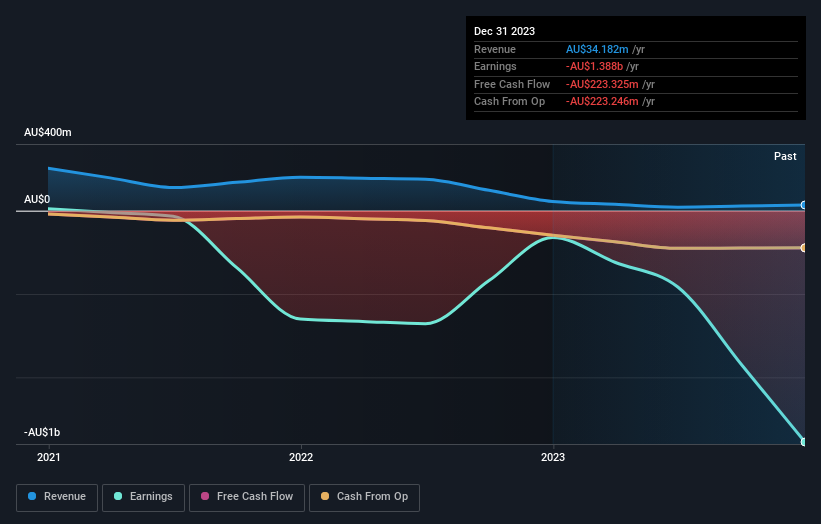- Australia
- /
- Oil and Gas
- /
- ASX:ERA
Strong week for Energy Resources of Australia (ASX:ERA) shareholders doesn't alleviate pain of three-year loss
Energy Resources of Australia Ltd (ASX:ERA) shareholders should be happy to see the share price up 16% in the last week. But that cannot eclipse the less-than-impressive returns over the last three years. Truth be told the share price declined 86% in three years and that return, Dear Reader, falls short of what you could have got from passive investing with an index fund. We really feel for shareholders in this scenario. It's a good reminder of the importance of diversification, and it's worth keeping in mind there's more to life than money, anyway.
The recent uptick of 16% could be a positive sign of things to come, so let's take a look at historical fundamentals.
View our latest analysis for Energy Resources of Australia
Energy Resources of Australia isn't currently profitable, so most analysts would look to revenue growth to get an idea of how fast the underlying business is growing. When a company doesn't make profits, we'd generally hope to see good revenue growth. That's because it's hard to be confident a company will be sustainable if revenue growth is negligible, and it never makes a profit.
In the last three years Energy Resources of Australia saw its revenue shrink by 59% per year. That means its revenue trend is very weak compared to other loss making companies. And as you might expect the share price has been weak too, dropping at a rate of 23% per year. Never forget that loss making companies with falling revenue can and do cause losses for everyday investors. It's worth remembering that investors call buying a steeply falling share price 'catching a falling knife' because it is a dangerous pass time.
The company's revenue and earnings (over time) are depicted in the image below (click to see the exact numbers).

You can see how its balance sheet has strengthened (or weakened) over time in this free interactive graphic.
What About The Total Shareholder Return (TSR)?
We'd be remiss not to mention the difference between Energy Resources of Australia's total shareholder return (TSR) and its share price return. Arguably the TSR is a more complete return calculation because it accounts for the value of dividends (as if they were reinvested), along with the hypothetical value of any discounted capital that have been offered to shareholders. Energy Resources of Australia hasn't been paying dividends, but its TSR of -47% exceeds its share price return of -86%, implying it has either spun-off a business, or raised capital at a discount; thereby providing additional value to shareholders.
A Different Perspective
It's nice to see that Energy Resources of Australia shareholders have received a total shareholder return of 16% over the last year. There's no doubt those recent returns are much better than the TSR loss of 2% per year over five years. This makes us a little wary, but the business might have turned around its fortunes. While it is well worth considering the different impacts that market conditions can have on the share price, there are other factors that are even more important. For instance, we've identified 3 warning signs for Energy Resources of Australia that you should be aware of.
But note: Energy Resources of Australia may not be the best stock to buy. So take a peek at this free list of interesting companies with past earnings growth (and further growth forecast).
Please note, the market returns quoted in this article reflect the market weighted average returns of stocks that currently trade on Australian exchanges.
Valuation is complex, but we're here to simplify it.
Discover if Energy Resources of Australia might be undervalued or overvalued with our detailed analysis, featuring fair value estimates, potential risks, dividends, insider trades, and its financial condition.
Access Free AnalysisHave feedback on this article? Concerned about the content? Get in touch with us directly. Alternatively, email editorial-team (at) simplywallst.com.
This article by Simply Wall St is general in nature. We provide commentary based on historical data and analyst forecasts only using an unbiased methodology and our articles are not intended to be financial advice. It does not constitute a recommendation to buy or sell any stock, and does not take account of your objectives, or your financial situation. We aim to bring you long-term focused analysis driven by fundamental data. Note that our analysis may not factor in the latest price-sensitive company announcements or qualitative material. Simply Wall St has no position in any stocks mentioned.
Have feedback on this article? Concerned about the content? Get in touch with us directly. Alternatively, email editorial-team@simplywallst.com
About ASX:ERA
Energy Resources of Australia
Engages in mine rehabilitation in Australia.
Slight risk with mediocre balance sheet.
Similar Companies
Market Insights
Community Narratives




